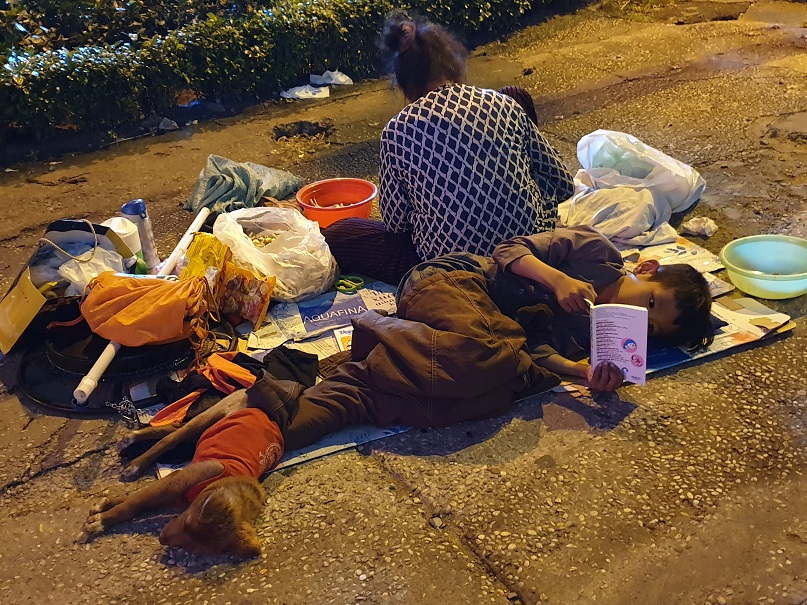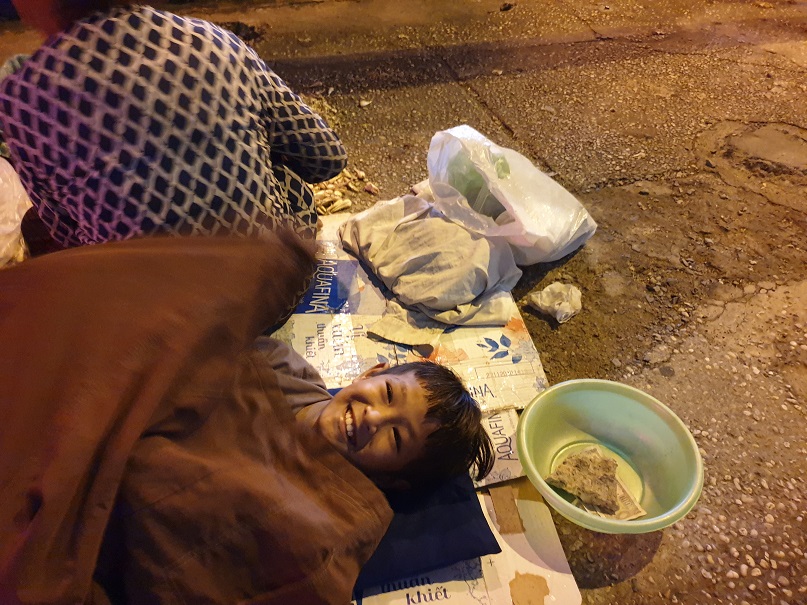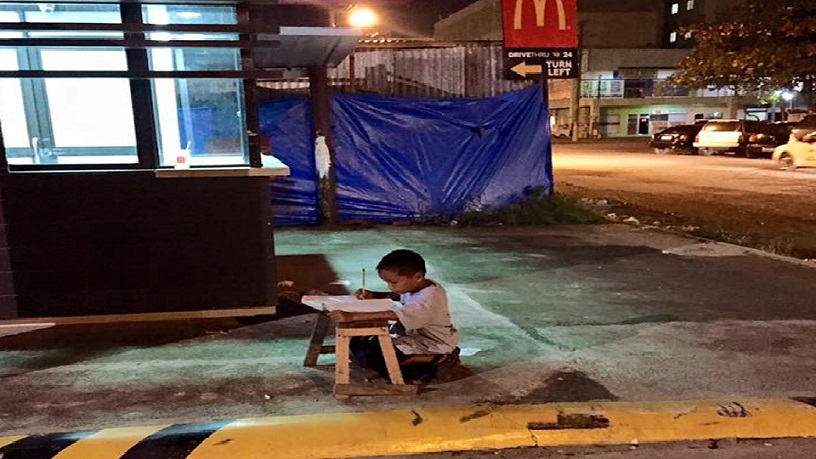
A boy reads a comic book by the light of a street lamp in Ho Chi Minh city. Photo by Ellen T.Tordesillas.
Across Ben Thanh market in Ho Chi Minh city, at a street corner, a little boy about seven or eight years old was lying on a spread out carton box material reading a comic book. With him was an old woman slicing mushrooms. At the feet of the boy was a dog dressed in red.
It was about seven o’clock in the evening. The light from a corner street lamp gave them illumination.
This was on the second day of 2019 and the city, still called “Saigon “by many, teemed with foreign tourists.
I asked permission to take their picture. The old woman responded with a kind smile and a nod. I approached and greeted the boy and he smiled so sweetly.
The touching scene looked familiar. I remembered Daniel Cabrera, the nine-year old boy from Cebu, whose picture doing his school assignment on the street pavement using the light from a McDonald’s outlet was captured by a medical student, Joyce Torrefranca, and moved the hearts of many when it was posted on social media three and a half years ago.
There is, however, a significant difference between the situation of the Ho Chi Minh city boy and Cabrera.
The Ho Chi Minh city boy was there to appeal for passersby’s charity. There was a small plastic basin near the boy for those with generous hearts to share their blessings. I saw one Indian boy give part of his Ben Thanh market purchases – a pack of biscuits.

The smile. Photo by Ellen T. Tordesillas.
In Cabrera’s case, news reports said his
family was rendered homeless by a fire that razed the crowded area they were
living in. His father died when he was three years old and his mother was
working in a makeshift eatery not far from the Mc Donald joint, whose lights he
was availing with to do his school work.
Torrefranca’s post of Cabrera attracted the attention of many including the government’s social welfare and services agency whose staff visited the boy’s family and extended help. McDonald gave him and his family dine- in privilege. Several organizations extended financial help and scholarships.
I don’t know about Vietnam’s policy with beggars. Except for two (the other one was a cute little girl about two years old, in a colorful stroller but the mother refused to have her picture taken) the streets where I have been to were generally free of beggars, in contrast to Manila where you see them everywhere – riding in jeepneys and bursting into Aegis’ “Basang basa sa ulan” or tapping car windows along Roxas Boulevard and at the corner of EDSA and Arnaiz street in Makati.
Beggars are an embarrassment to governments because they negate claims of economic progress. Social workers discourage giving alms because it doesn’t help them, they say. Police authorities say some are even part of a criminal syndicate.
The destitute are considered a distressing reality in life. In a world where the ideal is safe and pretty, they are seen as swatches of discomfort.

Nine -year old Daniel Cabrera doing his school assignment on the sidewalk in Cebu. Photo by Joyce Torrefranca. From ABS-CBN.
One of my holiday readings is the book “The Return of the Young Prince” by A.G Roemmers, a tribute to Antoine de Saint-Exupéry’s The Little Prince.
There are snippets from the book which I find relevant to the comic-book- reading boy on the sidewalk of Ho Chi Minh city:
“Often we withhold our support so we can give it only to those who deserve it. That’s a big mistake, because it’s not for us to judge the merits of others, which apart from anything else is extremely complicated.”
“We must only love. Just as with forgiveness, the person who loves most is the one most enriched by it. In the end, if God loves all human beings equally, who are we to exclude some and choose others?
“Pity anyone who take advantage of your kindness.
“Ultimately, if you dedicate your life to finding the best in people, you’ll end up finding the best in yourself.”
The Return of the Young Prince is set in Patagonia, a distinct geographical region at the base of South America spanning the lower sections of Argentina and Chile. The author said it is “ a land named after an indigenous tribe you could probably spot by their disproportionately large feet.”
Like Exupery’s The Little Prince, Roemmers’ The Return of the Young Prince invites us to revisit the power of unconditional love:
“.. we often act out of fear and mistrust, instead of letting ourselves be led by love that we mostly repress. Humanity has the curse (or blessing) that all human beings are interconnected. As long as any one of them is suffering, none of them will be completely happy. Nothing in this word is unknown to us, neither its pain nor its joy because ours is a world that still suffers even though there is bliss, which is still joyful though there is pain. The more we know our suffering, the more we will enjoy our happiness.”
Wonderful thoughtsto inspire us as we march into 2019 and beyond.